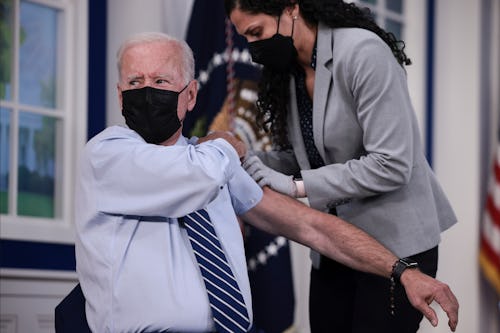
President Biden is a very old man. I can say that because it's objectively true. At 78 years old, with fully grown grandchildren, Biden is currently maxing out the average life expectancy in the United States, while entering the record books as the oldest president in American history.
As a bona fide Old, then, Biden flaunted his newfound eligibility for a COVID booster shot Monday, doffing his jacket to receive the vaunted third jab while multitasking for an informal press conference at the same time.
Bragging that he felt zero adverse side effects after his first two injections, Biden conspicuously did not look while receiving his third poke, even though watching yourself get inoculated is a classic tough guy move. To his credit, however, Biden seamlessly extolled the virtues of vaccinations and the United States's role in helping inoculate the rest of the world without so much as flinching the moment the attending nurse shoved a stick of metal into his arm.
In addition to providing a convenient photo op, Biden's on-camera jab was the latest in his White House's push for expanded first-time vaccinations, as the schism between the inoculated and those who can't (and often won't) get the vaccine widens into a full-blown crisis.
"Boosters are important, but the most important thing we need to do is get more people vaccinated," Biden urged.
"About 23% [of eligible adults] haven't gotten any shots, and that distinct minority is causing an awful lot of us an awful lot of damage for the rest of the country," he later explained. "This is a pandemic of the unvaccinated."
"One thing's for certain," he stressed elsewhere during the brief procedure: "A quarter of the country cannot go unvaccinated and us not continue to have a problem."
Biden also joked that "I know it doesn't look like it, but I am over 65. I'm way over," in a tacit admission that the medical community's messaging over who is eligible and able to receive booster shots has been hopelessly muddled.
"I recognize that confusion," CDC Director Dr. Rochelle Walensky acknowledged during a recent interview on CBS's Face the Nation. "Right now, our recommendation is for these limited people in the population, over 65, high-risk workers, high-risk community occupations, as well as high-risk by comorbidities," she continued.
Further complicating things is the fact that at the moment, only people who initially received the Pfizer vaccine are covered by the CDC's booster policy. Still, it's increasingly likely that the other brands of COVID vaccines will be added to the booster list as further research is conducted.







